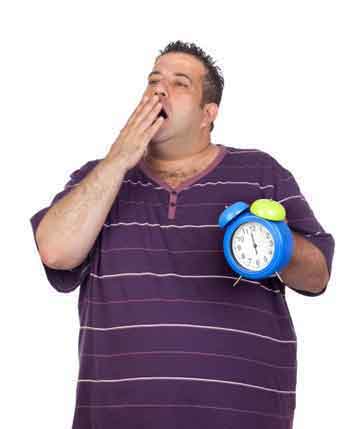Advertisement
 Does lack of sleep cause you to gain weight? Or does being overweight cause you to lose sleep? Is there such a thing as overweight sleep apnea? The answer to each of these questions is a definite YES, but not in the way you might think. Let’s start with lack of sleep causing obesity:
Does lack of sleep cause you to gain weight? Or does being overweight cause you to lose sleep? Is there such a thing as overweight sleep apnea? The answer to each of these questions is a definite YES, but not in the way you might think. Let’s start with lack of sleep causing obesity:
The Vicious cycle
At work, you start to feel distracted, and then a bit sleepy because you didn’t sleep so well the previous night; so you reach for a snack or a candy bar, or maybe a cup of coffee, or both. This makes make you feel a bit livelier but only for a brief period, and so you skip any exercise you had planned, and pick up some fast food on the way home.
Advertisement
Then you watch TV for a while before you get to sleep, but between the coffee, the fast food and the nagging feeling that you’re not doing your job well enough, you can’t sleep.This can become a terrible cycle of behavior that sabotages your every-day routine and causes you to put weight on fast. Does this sound familiar?
The key problem here is that when you are deprived of sleep for any reason, you end up feeling exhausted and hungry, and so you reach for the classic ‘comfort foods’. The immediate result is that you can fight off the sleepy feeling, but of course you put weight on, take less exercise and thus make it even harder to sleep when you should. The sleep debt accumulates and eventually, you can barely get through the day.
Sleep, Obesity and Diet - The Connection
For most people, the connection between sleep, diet and putting weight on is a very poorly understood aspect of our sleep cycle even though the science is clear. Most of us need seven to eight hours of sleep each night - sleeping more than this will not help our health in general (except adolescents and pregnant women) or help us to lose weight. However, if you are only sleeping for around five hours per night, and you start to sleep for seven or eight hours - your will lose weight and your health will improve. Why?
The effect occurs because of the hormones created in our bodies at night, and especially Ghrelin and Leptin. Ghrelin essentially makes you feel hungry, and leptin (the precursor of melatonin) primes your body for sleep. When you are sleep-deprived, ghrelin levels become too high and leptin and melatonin levels fall. This makes it almost inevitable that you will gain weight because leptin regulates the amount of fat in your body and tells your brain when you have had enough to eat. Ghrelin on the other hand makes you feel hungry - even when you dont need to eat.
Obesity and Sleeplessness
We’ve seen how lack of good quality sleep can cause obesity, but how does it work the other way around - how does obesity cause sleeplesness? The main way this occurs is through sleep apnea, which can make you wake up hundreds of times per night without you even remembering - you just feel exhausted in the morning and can’t cope at work. Of course, this drives you to the behavior we describes at the start of this article, and into an even more vicious circle.
Obesity Causes Insomnia and Sleep Apnea
Obesity in both children and adults is a major concern in the US and in the western world generally. One of the worst effects of obesity is the incidence of Sleep Apnea, which itself is a major cause of poor quality sleep. It is estimated that 18 million Americans suffer from sleep apnea, which is often associated with people who are overweight.
Margaret Moline, PhD, and Lauren Broch, PhD, two sleep specialists at New York Weill Cornell Medical Center have said that:
“If a person is overweight and suffering from sleep-disordered breathing, he/she may not be as motivated to exercise or to diet. When apnea leads to daytime sleepiness, it may be that much harder to begin or sustain an exercise program, which has been shown to help people begin or maintain weight loss.”
Sleep Foundation
It’s Even Worse for Children
The evidence suggests the association between inadequate sleep and higher BMI is stronger in children and adolescents.Science Daily 2012
As the quote above suggests, the incidence of obesity in children is just as bad as in adults. But again we must ask why? Is it due simply to diet and lack of exercise? The answer to that question is NO, because even though exercise and diet are critical, there is another factor at work in children - the blue light they are subjected to from iPads, televisions and other electronic screens.
We have an article on blue light and its effects on sleep on this site, but briefly, blue light suppresses the levels of melatonin in your body and makes it much harder to get to sleep at night. The later you are subjected to this light, the worse your sleep problems become. See the article for more information.
Dealing With Sleep Deprivation
To break this vicious cycle, you need to take serious note of the following:
- Avoid caffeine in the afternoon, because it can prevent you from reaching the deeper levels of sleep.
- Avoid electronic screens for at least an hour before you go to bed. The blue component of the light emitted by these screens depresses levels of the sleep hormone melatonin in your body and is a key factor in modern-day insomnia.
- Avoid eating high protein meals before bed - this is another cause of insomnia.
Of course, exercise is also hugely beneficial - even a small amount. But to break this vicious cycle, you need to do something about your loss of sleep, beginning with a basic diagnosis of why you are not sleeping well. There are many articles on this site to help you with this, starting off with Insomnia Symptoms, understanding why we sleep, and finally looking for a solution.
Conclusion
here is a wealth of evidence to show that people who don’t sleep properly suffer changes in hormonal levels that cause weight increase and generally poor health, often due to increased appetite, reduced capacity to exercise and having to produce much more insulin than those who sleep normally.
Actions You Can Take
There are a range of possible solutions on this site ranging from meditation to a reputable melatonin product to help regulate your sleep cycles.
In addition, we have articles on melatonin for children and on the many unexpected benefits of melatonin - here is one article on a truly wonderful anti-aging benefit. We also have articles on sleep that describe the benefits of snore pillows for sleep apnea and a range of sleep products advertised throughout the site. I hope you enjoy the site and most of all I hop you find the information you need here to begin your journey towards healthy sleep and weight loss.
SuzieQ on Google+
 Hi - I’m Suzie Quaterno, writer and marketer. I also suffer from lack of sleep at times, which is what prompted me to write for this site. Hope it’s useful and informative for you.
Hi - I’m Suzie Quaterno, writer and marketer. I also suffer from lack of sleep at times, which is what prompted me to write for this site. Hope it’s useful and informative for you.

